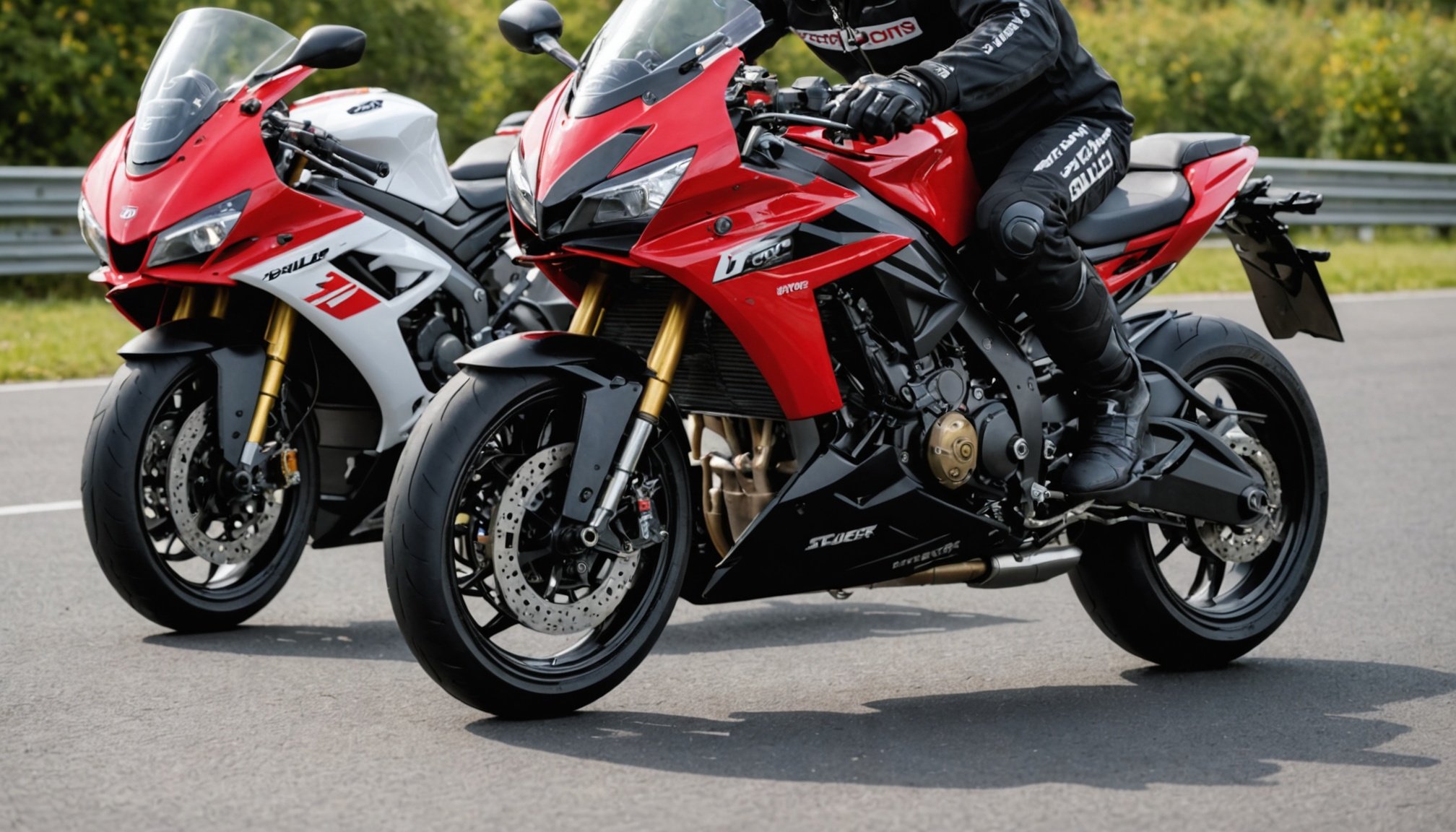Synthetic vs. Mineral Engine Oils: Unveiling the Best Choice for UK Sport Bikes
When it comes to maintaining the performance and longevity of your sport bike, one of the most critical decisions you’ll make is choosing the right engine oil. In the UK, where the climate can be quite varied and the roads demanding, the choice between synthetic and mineral engine oils is more than just a preference – it’s a necessity. Here’s a detailed look at the differences, benefits, and practical considerations to help you make the best choice for your motorcycle.
Understanding Engine Oils
Before diving into the synthetic vs. mineral debate, it’s essential to understand what engine oils do and why they are crucial for your bike.
Have you seen this : Essential Guidelines for Sport Bike Riders: How to Safely Use Action Cameras in the UK
Role of Engine Oils
Engine oils serve multiple critical functions:
- Lubrication: Reduces friction between moving parts, preventing wear and tear.
- Cooling: Helps in dissipating heat generated by the engine.
- Cleaning: Keeps the engine clean by carrying away contaminants and deposits.
- Seal Protection: Preserves the integrity of seals and gaskets, preventing oil leaks and maintaining compression.
Synthetic vs. Mineral Engine Oils
Synthetic Engine Oils
Synthetic engine oils are formulated from chemical compounds that are designed to provide superior performance in extreme conditions. Here are some key benefits:
Also to read : Essential Protective Gear Every Beginner Sport Bike Rider in the UK Should Have
- Superior Performance: Synthetic oils offer better engine protection, stability, and performance, especially in high-performance bikes. They maintain their viscosity better across a wide range of temperatures, ensuring consistent engine performance.
- Enhanced Additives: Synthetic oils often come with advanced additives that reduce engine friction, provide excellent engine cleanliness, and offer superior protection against wear and tear.
- Better Fuel Efficiency: Synthetic oils can improve fuel efficiency by reducing internal engine friction, allowing the engine to run more smoothly and efficiently.
Example: Castrol POWER1 Racing 4T 10W-30 is a fully synthetic oil designed for modern high-performance sports bikes, enhancing engine acceleration and power.
Mineral Engine Oils
Mineral engine oils, on the other hand, are derived from petroleum and are more budget-friendly. Here are some points to consider:
- Cost-Effective: Mineral oils are generally cheaper than synthetic oils, making them a more affordable option for casual riders or those on a budget.
- Basic Protection: While they provide the necessary lubrication and protection, mineral oils may not offer the same level of performance and durability as synthetic oils, especially in extreme conditions.
- Limited Viscosity Stability: Mineral oils tend to break down more quickly with temperature changes, which can affect their performance and the engine’s longevity.
Key Considerations for Choosing the Right Oil
Viscosity Grade
Viscosity is a critical factor in choosing the right engine oil. Here’s what you need to know:
- Viscosity Explained: Viscosity refers to the thickness or resistance of the oil flow. The right viscosity grade depends on factors like climate, riding conditions, and the manufacturer’s recommendations. Common viscosity grades for motorcycle engine oils include 10W-30, 10W-40, and 20W-50.
- Climate and Conditions: In colder climates, a lower viscosity oil (like 10W-30) is better for easier engine start-up and better fuel efficiency. In hotter climates or for high-performance riding, a higher viscosity oil (like 10W-40 or 20W-50) may be more suitable.
Performance Ratings
Look for oils that meet recognized performance standards:
- JASO, ACEA, API: These standards ensure the oil meets specific performance criteria. For example, JASO (Japanese Automotive Standards Organization) standards are particularly relevant for motorcycles, as they address the unique needs of motorcycle engines.
Bike Type
The type of bike you own is a significant factor in choosing the right oil:
- High-Performance Bikes: Synthetic oils are generally recommended for high-performance and racing motorcycles due to their superior protection and performance.
- Commuter Bikes: For commuter bikes or those with older engines, a good quality mineral or semi-synthetic oil might be sufficient, depending on the manufacturer’s recommendations.
Practical Insights and Actionable Advice
Checking the User Manual
Always refer to your bike’s user manual to determine the recommended oil type and viscosity. Here’s why:
- Manufacturer’s Recommendations: The manual will specify the acceptable oil variants and viscosity grades, ensuring you use the right oil for optimal performance and longevity.
Oil Change Best Practices
When changing your bike’s engine oil, follow these best practices:
- Drain the Old Oil: Ensure the old oil is completely drained before replacing it with the new oil. This prevents any compatibility issues and ensures the new oil works effectively.
- Use the Right Filter: Change the oil filter during the oil change to ensure the new oil is not contaminated with old debris.
Comparative Analysis: Synthetic vs. Mineral Oils
Here is a detailed comparison of synthetic and mineral engine oils:
| Characteristics | Synthetic Engine Oils | Mineral Engine Oils |
|---|---|---|
| Performance | Superior performance in extreme conditions | Basic protection, limited performance in extreme conditions |
| Viscosity Stability | Maintains viscosity across a wide temperature range | Breaks down more quickly with temperature changes |
| Additives | Advanced additives for better engine cleanliness and protection | Basic additives, limited engine cleanliness and protection |
| Fuel Efficiency | Improves fuel efficiency by reducing internal engine friction | Limited impact on fuel efficiency |
| Cost | Generally more expensive | More budget-friendly |
| Use Cases | High-performance bikes, racing motorcycles | Commuter bikes, casual riding |
| Viscosity Grades | Available in various viscosity grades (e.g., 10W-30, 10W-40) | Available in various viscosity grades (e.g., 10W-30, 20W-50) |
| Manufacturer Recommendations | Often recommended by manufacturers for high-performance bikes | May be recommended for older engines or commuter bikes |
Quotes and Expert Insights
- “Synthetic oils offer superior performance and protection, making them suitable for high-performance bikes,” says an expert from ACKO Insurance. “They maintain their viscosity better across a wide range of temperatures, ensuring consistent engine performance”.
- “The right engine oil can improve fuel efficiency by reducing internal engine friction and helping the engine run more smoothly,” notes a Liqui Moly FAQ. “This means more miles per liter and fewer trips to the petrol station”.
Real-World Examples and Anecdotes
High-Performance Riding
For sport bike enthusiasts who push their limits, synthetic oils are often the go-to choice. Here’s an example:
- A rider who participates in track days might use Castrol POWER1 Racing 4T 10W-30 to enhance engine acceleration and power. This fully synthetic oil is designed for modern high-performance sports bikes and provides the necessary protection and performance under demanding conditions.
Commuter Bikes
For those who use their bikes for daily commuting, a good quality mineral or semi-synthetic oil might be sufficient.
- A commuter who rides a Yamaha bike might opt for a high-quality mineral oil that is proven to perform well in various conditions. This choice is more budget-friendly and still provides the necessary protection for the engine.
Choosing the right engine oil for your UK sport bike is a decision that should not be taken lightly. Synthetic oils, with their superior performance, advanced additives, and better viscosity stability, are generally the best choice for high-performance and racing motorcycles. However, for commuter bikes or those on a budget, a good quality mineral oil can still provide the necessary protection and performance.
Final Tips
- Always Check the Manual: Before making any decision, refer to your bike’s user manual to ensure you are using the recommended oil type and viscosity.
- Consider Your Riding Style: If you are a high-performance rider, synthetic oils are likely your best bet. For casual riding, mineral oils might suffice.
- Regular Maintenance: Regular oil changes and filter replacements are crucial for maintaining your bike’s engine health, regardless of the oil type you choose.
By understanding the differences between synthetic and mineral engine oils and considering your specific needs, you can ensure your sport bike runs at its best, whether you’re carving through the countryside or pushing the limits on the track.











